仁爱新版英语八年级上册unit3 topic1_复习课件
合集下载
仁爱版八年级英语上册 Unit 3 Topic 1 Section A 课件(共21张PPT)全
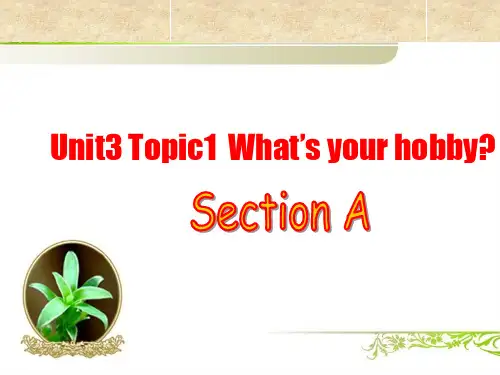
7. I _pr_ef_er___ playing soccer.
Summarize the ways of talking about hobbies!
1. I love singing and playing the guitar. 2. I am interested in playing basketball. 3. I enjoy dancing to music. 4. I like sleeping. 5. I like reciting poems. 6. I am fond of acting. 7. I prefer playing soccer.
different hobbies. I like…
Different ways of talking about hobbies:
…love/enjoy/like/prefer/am interested in/am fond of …
Written work
提升练习
Use the sentence patterns we just have learned to write a passage about your group members’ hobbies.
视频1a-P55
go fishing
enjoy reading stories
go to the movie theater
love reciting poems enjoy listening to music watch DVDs at home
Read 1a and fill in the blanks.
1. I love _si_ng_in_g___and playing the guitar.
+Unit+3+Topic+1+复习课件+2023-2024学年仁爱版八年级英语上册
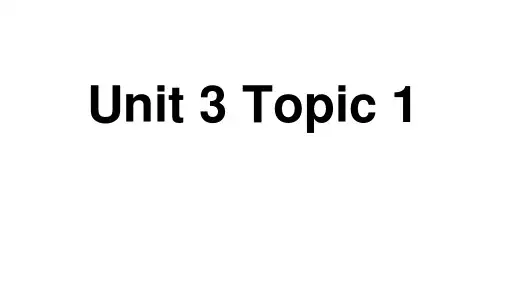
• 15. 这是我的集邮册 • It’s my ___st_a_m_p__coll_e_c_ti_o_n____. • 16. 多美丽的邮票啊! • __W_h_a_t_b_e_a_u_t_if_u_l _st_a_m_p_s_!__W__h_a_t _a_b_e_a_utiful stamp! • 17. 它一定很有趣 • __It_m__u_st__b_e_g_re_a_t_f_u_n_. _____________ • 18. 我们可以从邮票学到很多关于历史和人物 • We can _l_e_ar_n__ __a_____ _l_o_t____ about
• 7. 听起来不错 • _S_o_u_n_d_s_g_o_o_d_. _____________________________
• 8. 或许我需要一个改变 • _M_a_y_b_e_ I need a __c_h_a_n_ge__. = I _m__ay___need a _c_h_a_n_g_e_.
• 30. 制作你的剪贴簿将会很有趣 • It will be lots of ___fu_n_ _t_o____ma_k_e____ your
scrapbook. • 31. 你可以跟你的朋友们分享它 • You can __s_h_a_r_e___ it _w_i_th_____ your friends. • 32. 他们过去在春天经常干什么?
• 11. He enjoys collecting stamps.
• 12. She is fond of walking a pet dog.
• 13. They are interested in climbing mountains/hills.
• 14. She likes planting flowers.
仁爱版八年级英语上册Unit 3 Topic 1复习课件(共16张PPT)
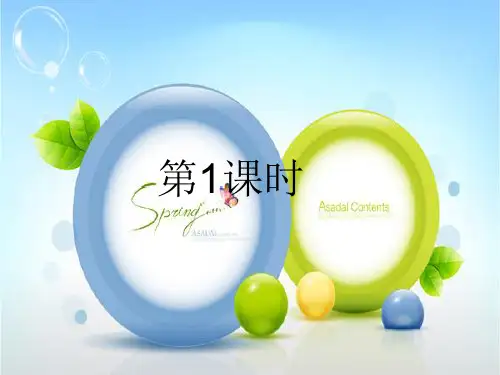
3. Can you help me _____w__a_lk_t_h_e_/_m__y_d_o_g______(遛狗)? 4. —Who do you often do __o__u_td_o_o_r_a_c_t_iv_i_ti_e_s(户外运动) with?
—My classmates. 5. Henry likes listening to Beijing Opera __i_n_h_i_s_f_re_e__ti_m_e___
Her wet clothes are ___s_t_ic_k_i_n_g_t_o_____ her body. 3. 男孩正从一张报纸上剪下一张图片。
The boy is ___c_u_t_ti_n_g_o_u_t_____ a picture from a newspaper. 4. 王老师昨天做了演讲,他以一个故事开头。
3. Our Chinese teacher asked us to recite these three _p_o__e_m_s_(poem) this week.
4. —What’s your __h_o_b_b_y__/'hɑ:bi/? —I like drawing pictures.
5. Mary has many _p_e_t_s_____(pet). She keeps two cats, three dogs and many fish at home.
—I don’t know. Maybe it’s Lucy’s. 3. Liu Mei was too afraid to say a word when she saw a(n)
___s_n_a_k_e__ in the grass. 4. Your T-shirt is ____d_ir_t_y__. Take it off and wash it right now. 5. My grandfather keeps a lot of sheep and ____p_ig_s__ on his
—My classmates. 5. Henry likes listening to Beijing Opera __i_n_h_i_s_f_re_e__ti_m_e___
Her wet clothes are ___s_t_ic_k_i_n_g_t_o_____ her body. 3. 男孩正从一张报纸上剪下一张图片。
The boy is ___c_u_t_ti_n_g_o_u_t_____ a picture from a newspaper. 4. 王老师昨天做了演讲,他以一个故事开头。
3. Our Chinese teacher asked us to recite these three _p_o__e_m_s_(poem) this week.
4. —What’s your __h_o_b_b_y__/'hɑ:bi/? —I like drawing pictures.
5. Mary has many _p_e_t_s_____(pet). She keeps two cats, three dogs and many fish at home.
—I don’t know. Maybe it’s Lucy’s. 3. Liu Mei was too afraid to say a word when she saw a(n)
___s_n_a_k_e__ in the grass. 4. Your T-shirt is ____d_ir_t_y__. Take it off and wash it right now. 5. My grandfather keeps a lot of sheep and ____p_ig_s__ on his
仁爱版八年级英语上册Unit3 Topic 1 SectinB课件(共22张PPT)
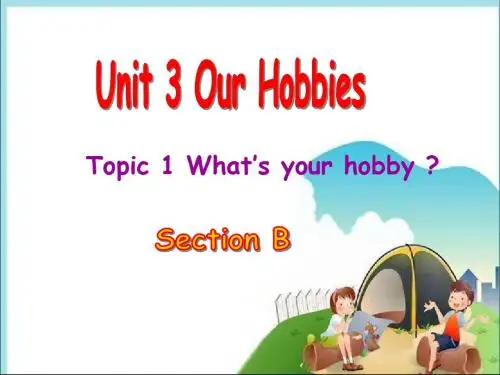
Name
Hobby
Now
In the past
Report like this :
Xiao wei loves/enjoys/likes/prefers/is interested in/is fond of … But she used to … one year ago. …
I can say:
True False
4. We can learn a lot about history and True False people from stamps.
Read 1a and fill in the blanks.
Maria likes _co_l_le_c_t_i_n_g stamps and she _co_l_le_c_t_e_d_ them when she was in Cuba. She thinks we can learn a lot about _h_i_st_o_r_y_ and _pe_o_p_l_e_ from stamps. And now she has many beautiful Chinese stamps. Michael __us_e_d__t_o__ collect baseball cards when he was in America. Now __pl_a_y_in_g__ basketball is his hobby. Kangkang is interested in _s_w__im_m__in_g__ . The three children have different _h_o_b_b_i_e_s__ .
Eg:1.—— Did he use to go fishing on Sundays ?
Unit 3 Topic 1 Section A-八年级英语上册课件(仁爱版)
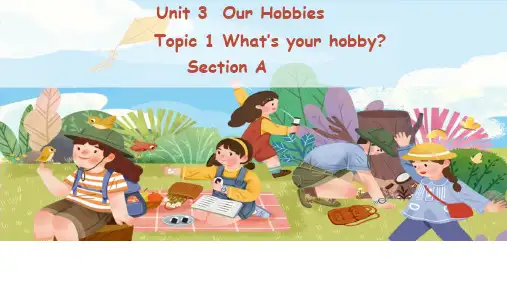
Key points
Helen: What do you often do in your free time? in one’s free time
在某人的空闲时间 Wen Wei: I often go fishing. It’s my favorite hobby. And I also enjoy reading stories and
1b Listen to 1a and choose the correct answer.
What are Helen and Wen Wei talking about ? A. Going to the movie theater. B. Their hobbies. C. Outdoor activities.
poems.
4. I like _s_l_e_e_p_i_n_g__.
6. I am fond of__a_c_ti_n_g__.
7. I __p_r_e_f_e_r___
playing soccer.
While-listening 1a Look, listen and say.
Helen: What do you often do in your free time? Wen Wei: I often go fishing. It’s my favorite hobby.
be interested in doing sth. 喜欢做某事 recite poems 背诗
Make dialogs.
A: What’s your hobby? B: I like/love/enjoy/prefer/am fond of/am interested in .......
仁爱新版英语八年级上册unit3--topic1-复习课件(共24张PPT)

• 否定形式:didn’t use to 或usedn’t to 一 般疑问句:Did …use to…? 或Used …to…? 如:
• {He didn’t use to drink beer. • {He usedn’t to drink beer. 过去他不常喝酒。 • {Did he use to play baskerball? • {Used he to piay basketball? 过去他经常打篮
at home. 介词后可用whetherቤተ መጻሕፍቲ ባይዱ不用if。如:
I haven’t settled the question of whether I’ll go back home.
We can learn a lot about people, places, history, and special times from stamps. 通过这些邮票我们可以学到许多关于人文、 地理、历史和特殊时代的知识。
多漂亮的邮票啊! What beautiful stamps!/How beautiful the stamps are! 你和我有共同的爱好吗? Do you share my interests? 我现在是一个足球迷,但是我过去是一个影迷。 I’m a soccer fan, but I used to be a movie fan. 我对运动一点不感兴趣。 I wasn’t interested in sports at all. 我的爱好是做运动,像游泳和踢足球。 My hobby is doing sports like swimming and playing soccer. 谁教你游泳的?没有人教,我是自学的。
What’s your hobby ?
• {He didn’t use to drink beer. • {He usedn’t to drink beer. 过去他不常喝酒。 • {Did he use to play baskerball? • {Used he to piay basketball? 过去他经常打篮
at home. 介词后可用whetherቤተ መጻሕፍቲ ባይዱ不用if。如:
I haven’t settled the question of whether I’ll go back home.
We can learn a lot about people, places, history, and special times from stamps. 通过这些邮票我们可以学到许多关于人文、 地理、历史和特殊时代的知识。
多漂亮的邮票啊! What beautiful stamps!/How beautiful the stamps are! 你和我有共同的爱好吗? Do you share my interests? 我现在是一个足球迷,但是我过去是一个影迷。 I’m a soccer fan, but I used to be a movie fan. 我对运动一点不感兴趣。 I wasn’t interested in sports at all. 我的爱好是做运动,像游泳和踢足球。 My hobby is doing sports like swimming and playing soccer. 谁教你游泳的?没有人教,我是自学的。
What’s your hobby ?
仁爱版初中英语八年级上册Unit 3Topic 1 What's your hobbyPPT课件
Practice 1a with your partner. Then make similar conversations, talking about what you often do in your spare time.
What do you often do in your spare time?
35 students like singing in our class …
playing basketball collecting toys reading novels listening to music playing soccer traveling cooking making model planes
Finish the survey of 4, and write a passage about it. You can begin like this:
I often …
2a
Look, listen and say
(影片2)
I like laughing.
I am fond of playing basketball.
I enjoy dancing very much! I prefer singing songs.
I am interested in having delicious food!
I like sleeping best.
2b
Group work
Talk about your own hobbies with your partners, using ns in 2a.
Name
Hobby
Report like this :
Kangkang likes … … is fond of … … is interested in … … enjoys …
仁爱版八年级英语上册 Unit 3 Topic 1 Section A 课件(共22张PPT)
Sounds good!
•9、要学生做的事,教职员躬亲共做;要学生学的知识,教职员躬亲共学;要学生守的规则,教职员躬亲共守。2021/8/252021/8/25Wednesday, August 25, 2021 •10、阅读一切好书如同和过去最杰出的人谈话。2021/8/252021/8/252021/8/258/25/2021 6:20:17 AM •11、只有让学生不把全部时间都用在学习上,而留下许多自由支配的时间,他才能顺利地学习……(这)是教育过程的逻辑。2021/8/252021/8/252021/8/25Aug-2125-Aug-21 •12、要记住,你不仅是教课的教师,也是学生的教育者,生活的导师和道德的引路人。2021/8/252021/8/252021/8/25Wednesday, August 25, 2021
1. Read and recite 1a. 2. Make sentences with the
words and phrases of 2. 3. Preview Section B.
4. I like __sl_ee_pi_ng___.
5. I like _r_ec_iti_ng__ poems.
Collecting different expressions with similar meanings will help you in your talking and writing.
enjoy singing
loves dancing
3. do some outdoor activities
4. Maybe I need a change . 也许我需要改变一下。 Maybe (副词)也许 change (名词)改变 ;零钱
•9、要学生做的事,教职员躬亲共做;要学生学的知识,教职员躬亲共学;要学生守的规则,教职员躬亲共守。2021/8/252021/8/25Wednesday, August 25, 2021 •10、阅读一切好书如同和过去最杰出的人谈话。2021/8/252021/8/252021/8/258/25/2021 6:20:17 AM •11、只有让学生不把全部时间都用在学习上,而留下许多自由支配的时间,他才能顺利地学习……(这)是教育过程的逻辑。2021/8/252021/8/252021/8/25Aug-2125-Aug-21 •12、要记住,你不仅是教课的教师,也是学生的教育者,生活的导师和道德的引路人。2021/8/252021/8/252021/8/25Wednesday, August 25, 2021
1. Read and recite 1a. 2. Make sentences with the
words and phrases of 2. 3. Preview Section B.
4. I like __sl_ee_pi_ng___.
5. I like _r_ec_iti_ng__ poems.
Collecting different expressions with similar meanings will help you in your talking and writing.
enjoy singing
loves dancing
3. do some outdoor activities
4. Maybe I need a change . 也许我需要改变一下。 Maybe (副词)也许 change (名词)改变 ;零钱
仁爱版八年级英语上册 Unit 3 Topic 1 Section D 课件(共19张PPT)
( D) 4.They are fond___reading stories.
A. with
B. for
C.in
D.of
A: What’s your hobby? B: I used to…but now I like/love…
1、keep pet 养宠物 2、provide sb. with sth. 为某人提供某物 3、like/love/enjoy/be fond of/ 喜欢做某事
be interested in doing sth. 4、used to do sth. 过去常做某事
Listen and think ! The best title of the passage is _____. A. I Love Pink B. Pink Likes Walking. C. My Favorite Pet.
Pink likes walking. Pink loves walking. Pink enjoys walking. Pink is interested in walking. Pink is fond of walking.
Topic 1 What’s your hobby ?
pet
Read the passage quickly and underline the following sentence.
All pets provide their owners with love and comfort in their lives.
B:I love…and you?
I like running now. But I liked swimming before.
I used to swim. used to do sth.过去常做某事
八年级英语上Unit3_Topic1_Part1课件仁爱版
Task 1: Free talk
Free talk
What are you interested in doing? Why?
Task 2: Pair work
Pair work
Make a dialog with your partner.
A: B: A: B:
What do you like doing? I like … Why do you like it? Because …
cook
What are you interested in doing? I am interested in doing sth..
I am interested in singing.
What are you interested in doing? I am interested in doing sth..漳州三中 英语组 衣媛群
My secrets
• 1. I like reading stories.
• 2. I like waching TV. • 3. I like planting flowers.
Unit 3 Our Hobbies
Topic 1 Section A
What's your hobby?
What are you fond of doing? I am fond of doing sth..
walk a pet dog
What are you fond of doing? I am fond of doing sth..
run
What are you fond of doing? I am fond of doing sth..
I like playing … .
- 1、下载文档前请自行甄别文档内容的完整性,平台不提供额外的编辑、内容补充、找答案等附加服务。
- 2、"仅部分预览"的文档,不可在线预览部分如存在完整性等问题,可反馈申请退款(可完整预览的文档不适用该条件!)。
- 3、如文档侵犯您的权益,请联系客服反馈,我们会尽快为您处理(人工客服工作时间:9:00-18:30)。
What’s your hobby ?
在某人空闲时间 去电影院 做户外运动 遛狗 收集邮票 远足旅行 从…学习… …中的一些 非常有价值 一定 过去常常 对…满意 和某人分享某物
in one’s spare time go to the movie theater do outdoor activities walk a pet dog collect stamps go hiking learn …from some of be of great value must be used to be pleased with… share sth with sb
你过去有些什么爱好? What hobbies did you use to have? 空闲时间你经常做什么 What do you often do in your spare time? 为什么不出去做些户外运动呢 Why not go out and do some outdoor activities. 或许我需要改变。 Maybe I need a change. 我对随着音乐跳舞感兴趣。 I’m interested in dancing to music. 我喜欢遛狗。 I’m fond of walking a pet dog.
We can learn a lot about people, places, history, and special times from stamps. 通过这些邮票我们可以学到许多关于人文、 地理、历史和特殊时代的知识。 a lot “许多、大量”,用在动词后,同very much。如: 1)She had told me a lot about how to learn English well. 她告诉我许多有关怎样学好英语的方法。 2)Thanks a lot.非常感谢。 另外,a lot of 和lots of 的意思也是“许多、大量”,要用在名词前, 在肯定句中常代替much,many。在口语中尤其如此。如: There are a lot of / lots of history books in the room.屋里有许多 历史书。 There is still a lot of / lots of snow on top of the house.房上仍有 许多雪。 a lot of和lots of之间没有多大区别,都可以与可数名词和不可数名 词连用。与不可数名词连用时,动词用单数,与可数名词连用时, 动词用复数。
·福建省专用
│ 重点突破
2 whether conj. 是否 He doesn't mind whether they're good or not. 他并不介意他们是好是坏。 [点拨] 常用来引导宾语从句,且能与or not连用。 I don't know whether I will be able to come. 我不知道我是否能来。
·福建省专用
│ 重点突破
活学活用 ( D )—Do you think ________ Xiaoming can pass the high school entrance exam or not? —Sorry, I've no idea. A.that B.which C.if D .whether
他们养宠物,上网聊天或收集东西,如硬币,洋娃娃或邮票。 They keep pets, chat on the Net and collect things such as coins, dolls or stamps. 你过去有什么爱好? What hobbies did you use to have? 过去暑假期间你常去游泳吗? Did you use to go swimming during the summer vacation?
·福建省专用
│ 重点突破
2.根据汉语意思完成句子 used to be farmer, but now he is a (1)My father ___________a worker. 我父亲过去是一位农民,但现在他已是一名工人了。 used to read novels, but now I don't enjoy it. (2)I ____________ 我过去经常读小说,但现在不喜欢读了。 Did you ______ (3)—____ use to go swimming? —Yes, I did. “你过去经常游泳吗?”“是的,我经常游泳。”
他喜欢水,我经常在我家后面的池塘里帮他洗澡。 He likes water and I often help him take a bath in the pond behind my house.
他不介意它们是好的还是坏的。 He doesn’t mind whether they are good or not.
"喜欢"的表达方式还有:
• • • • • • like love enjoy prefer be fond of be interested in
Grammar Structure
• • • • • • • 1.in one's spare time=in one's free time 在某人的空闲时间 2.why not=why don't you ,后接动词原形。 what about=how about ,后接动词-ing。 would like 后接动词不定式。 3.interested 和interesting的区别 ① interested是指“对…产生兴趣的,对…感兴趣的”,一 般用人做主语,后常用介词in,做表语不作定语。sb be interested in sth。 • Women are always interested in fashions.女人总对时 装感兴趣。 • ②interesting的意思是“有趣的”,指能够给人带来兴趣的 某人或某事物,一般修饰物,做表语和定语 。 • He is an interesting old man.他是个有趣的老头。
prefer的用法
• 1.相当于like----better,后接名词,代词,动 名词。 • 2.prefer to 常与rather than,instead of 连用
•
eg.He preferred to die rather than (to) steal. / He perferred to die instead of stealing. 他宁死也不去偷窃。 • I prefer to watch TV rather than go out.我宁愿呆在家里 也不出去。
• 3.prefer sth to sth • 4.prefer doing sth to doing sth .
( B)1.prefer_____basketball to_____model planes. A.to play; make B.playing;making C.palying;make D.play;make
过去经常做某事 习惯做某事 在暑假 自学 网上聊天 日常工作 在池塘里 在…前面教某人 (做)某事 养宠物 例如 洗澡
used to do sth be/get used to doing sth during/in the summer vacation teach oneself chat on the Net daily work in the pond in front of teach sb (to do )sth keep pets such as take a bath
be used to do,used todo 和 be used to doing的区别
• used to表示“过去常常做某事”. • be used to do的意思是“被用来做某事”; • be used to doing的意思是“习惯于做某 事”.
│ 重点突破
活学活用 1.单项填空 ( C ) I ________ keep dogs for protection, but now I keep them as pets. A.would rather B.had better C.used to D .have to
Hale Waihona Puke ·福建省专用if与whether的区别。 二者在引导宾语从句时一般可换用。如: 1)I want to know if / whether it is going to rain tomorrow. 2) He didn’t understand if / whether the stranger told a lie. 但下列几种情况不能换用。 whether 后可紧接or not,而if一般不能。 Let me know whether or not you can come. 你能来还是不能来,请告诉我一声。 whether引导的宾语从句可移到主句前,if则不能。 如:Whether this is true or not, I can not say. 不定式前用whether,不用if。 如:I haven’t decided whether to go to the cinema or to stay at home. 介词后可用whether,不用if。如: I haven’t settled the question of whether I’ll go back home.
多漂亮的邮票啊! What beautiful stamps!/How beautiful the stamps are! 你和我有共同的爱好吗? Do you share my interests? 我现在是一个足球迷,但是我过去是一个影迷。 I’m a soccer fan, but I used to be a movie fan. 我对运动一点不感兴趣。 I wasn’t interested in sports at all. 我的爱好是做运动,像游泳和踢足球。 My hobby is doing sports like swimming and playing soccer. 谁教你游泳的?没有人教,我是自学的。 Who taught you to swim? Nobody. I taught myself.
在某人空闲时间 去电影院 做户外运动 遛狗 收集邮票 远足旅行 从…学习… …中的一些 非常有价值 一定 过去常常 对…满意 和某人分享某物
in one’s spare time go to the movie theater do outdoor activities walk a pet dog collect stamps go hiking learn …from some of be of great value must be used to be pleased with… share sth with sb
你过去有些什么爱好? What hobbies did you use to have? 空闲时间你经常做什么 What do you often do in your spare time? 为什么不出去做些户外运动呢 Why not go out and do some outdoor activities. 或许我需要改变。 Maybe I need a change. 我对随着音乐跳舞感兴趣。 I’m interested in dancing to music. 我喜欢遛狗。 I’m fond of walking a pet dog.
We can learn a lot about people, places, history, and special times from stamps. 通过这些邮票我们可以学到许多关于人文、 地理、历史和特殊时代的知识。 a lot “许多、大量”,用在动词后,同very much。如: 1)She had told me a lot about how to learn English well. 她告诉我许多有关怎样学好英语的方法。 2)Thanks a lot.非常感谢。 另外,a lot of 和lots of 的意思也是“许多、大量”,要用在名词前, 在肯定句中常代替much,many。在口语中尤其如此。如: There are a lot of / lots of history books in the room.屋里有许多 历史书。 There is still a lot of / lots of snow on top of the house.房上仍有 许多雪。 a lot of和lots of之间没有多大区别,都可以与可数名词和不可数名 词连用。与不可数名词连用时,动词用单数,与可数名词连用时, 动词用复数。
·福建省专用
│ 重点突破
2 whether conj. 是否 He doesn't mind whether they're good or not. 他并不介意他们是好是坏。 [点拨] 常用来引导宾语从句,且能与or not连用。 I don't know whether I will be able to come. 我不知道我是否能来。
·福建省专用
│ 重点突破
活学活用 ( D )—Do you think ________ Xiaoming can pass the high school entrance exam or not? —Sorry, I've no idea. A.that B.which C.if D .whether
他们养宠物,上网聊天或收集东西,如硬币,洋娃娃或邮票。 They keep pets, chat on the Net and collect things such as coins, dolls or stamps. 你过去有什么爱好? What hobbies did you use to have? 过去暑假期间你常去游泳吗? Did you use to go swimming during the summer vacation?
·福建省专用
│ 重点突破
2.根据汉语意思完成句子 used to be farmer, but now he is a (1)My father ___________a worker. 我父亲过去是一位农民,但现在他已是一名工人了。 used to read novels, but now I don't enjoy it. (2)I ____________ 我过去经常读小说,但现在不喜欢读了。 Did you ______ (3)—____ use to go swimming? —Yes, I did. “你过去经常游泳吗?”“是的,我经常游泳。”
他喜欢水,我经常在我家后面的池塘里帮他洗澡。 He likes water and I often help him take a bath in the pond behind my house.
他不介意它们是好的还是坏的。 He doesn’t mind whether they are good or not.
"喜欢"的表达方式还有:
• • • • • • like love enjoy prefer be fond of be interested in
Grammar Structure
• • • • • • • 1.in one's spare time=in one's free time 在某人的空闲时间 2.why not=why don't you ,后接动词原形。 what about=how about ,后接动词-ing。 would like 后接动词不定式。 3.interested 和interesting的区别 ① interested是指“对…产生兴趣的,对…感兴趣的”,一 般用人做主语,后常用介词in,做表语不作定语。sb be interested in sth。 • Women are always interested in fashions.女人总对时 装感兴趣。 • ②interesting的意思是“有趣的”,指能够给人带来兴趣的 某人或某事物,一般修饰物,做表语和定语 。 • He is an interesting old man.他是个有趣的老头。
prefer的用法
• 1.相当于like----better,后接名词,代词,动 名词。 • 2.prefer to 常与rather than,instead of 连用
•
eg.He preferred to die rather than (to) steal. / He perferred to die instead of stealing. 他宁死也不去偷窃。 • I prefer to watch TV rather than go out.我宁愿呆在家里 也不出去。
• 3.prefer sth to sth • 4.prefer doing sth to doing sth .
( B)1.prefer_____basketball to_____model planes. A.to play; make B.playing;making C.palying;make D.play;make
过去经常做某事 习惯做某事 在暑假 自学 网上聊天 日常工作 在池塘里 在…前面教某人 (做)某事 养宠物 例如 洗澡
used to do sth be/get used to doing sth during/in the summer vacation teach oneself chat on the Net daily work in the pond in front of teach sb (to do )sth keep pets such as take a bath
be used to do,used todo 和 be used to doing的区别
• used to表示“过去常常做某事”. • be used to do的意思是“被用来做某事”; • be used to doing的意思是“习惯于做某 事”.
│ 重点突破
活学活用 1.单项填空 ( C ) I ________ keep dogs for protection, but now I keep them as pets. A.would rather B.had better C.used to D .have to
Hale Waihona Puke ·福建省专用if与whether的区别。 二者在引导宾语从句时一般可换用。如: 1)I want to know if / whether it is going to rain tomorrow. 2) He didn’t understand if / whether the stranger told a lie. 但下列几种情况不能换用。 whether 后可紧接or not,而if一般不能。 Let me know whether or not you can come. 你能来还是不能来,请告诉我一声。 whether引导的宾语从句可移到主句前,if则不能。 如:Whether this is true or not, I can not say. 不定式前用whether,不用if。 如:I haven’t decided whether to go to the cinema or to stay at home. 介词后可用whether,不用if。如: I haven’t settled the question of whether I’ll go back home.
多漂亮的邮票啊! What beautiful stamps!/How beautiful the stamps are! 你和我有共同的爱好吗? Do you share my interests? 我现在是一个足球迷,但是我过去是一个影迷。 I’m a soccer fan, but I used to be a movie fan. 我对运动一点不感兴趣。 I wasn’t interested in sports at all. 我的爱好是做运动,像游泳和踢足球。 My hobby is doing sports like swimming and playing soccer. 谁教你游泳的?没有人教,我是自学的。 Who taught you to swim? Nobody. I taught myself.
